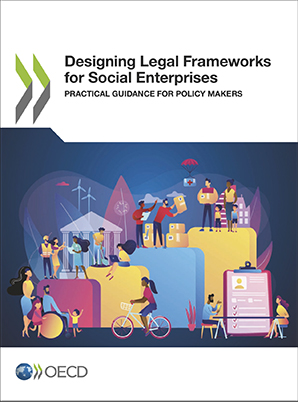OECD has just published the manual ‘Designing Legal Frameworks for Social Enterprises’ This manual was produced by the OECD Centre for Entrepreneurship, SMEs, Regions and Cities (CFE,) led by Lamia Kamal-Chaoui, Director. It was produced with the financial support of the European Union. The manual was prepared by Amal Chevreau, James Hermanson and Julie Rijpens, Policy Analysts, with guidance from Antonella Noya, Head of the Social Economy and Innovation Unit and under the supervision of Karen Maguire, Head of the Local Employment, Skills and Social Innovation Division (OECD).
This Manual provides guidance to help policy makers achieve the following goals: (1) assess the rationale and relevance for developing new or updating legal frameworks specific to social enterprises; (2) analyse critical factors when designing legal frameworks for social enterprises; and (3) explore options and tools to ensure stakeholder involvement in the elaboration of legal frameworks for social enterprises as well as their assessment and evaluation.
Ten EU Member States were investigated with the objective to capture the diversity of practice, draw lessons and inspiring examples. These countries are Belgium, Denmark, France, Italy, Luxembourg, the Netherlands, Poland, Slovakia, Slovenia and Spain.
There is strong potential for social enterprises to promote and advance inclusive and sustainable growth and offer opportunities to many groups to create economic activities with social impacts. Social enterprises have grown in prominence and expanded their reach across the globe. However, their potential is still not fully exploited. Awareness and evidence need to be built around how legal frameworks, tailored or not, can effectively unlock this potential.
The Manual explains that the number of social enterprises has increased in recent decades. In the European Union, based on national-level data, there are roughly 397 000 social enterprises with variation among member states. Due to multiple definitions and varying degrees of legal recognition for social enterprises, the quality of data on social enterprises differs between countries and even subnational regions.
There is growing legal recognition of social enterprises. In the EU, 16 countries have adopted some form of legislation specific to social enterprises over the past two decades. Likewise, countries have also utilised fiscal frameworks for social enterprises, with some awarding tax exemptions to specific legal forms or creating fiscal incentives for individuals to donate or invest in social enterprises.
OECD research indicates that with adequate design and effective implementation, legal frameworks can be a powerful tool to foster and bolster social enterprise development. Legal frameworks may support social enterprises develop and thrive by clarifying what they are and what authorities can do to best tailor legal provisions to meet their needs.
The Manual is complemented inspiring practices and experiences from EU and OECD countries to unveil challenges, gaps and opportunities regarding regulations for social enterprises. Finally, it identifies potential criteria to assess legal frameworks performance. It takes into consideration the criteria used in the European Commission / OECD “Better Entrepreneurship Policy Tool” and complementary work such as OECD Framework for Regulatory Policy Evaluation, which assists countries in evaluating the design and implementation of regulatory policy, against the achievement of strategic regulatory objectives.
The manual is published in English and the summary in 3 languages: French, Spanish and English:
– « Concevoir des cadres légaux pour les entreprises sociales: Guidance pratique pour les décideurs – Synthèse du manuel “
– « Diseñando marcos legales para las empresas sociales: Guía práctica para los encargados de formular políticas – Resumen del manual”
– “Designing Legal Frameworks for Social Enterprises: Practical guidance for policy makers – Manual Summary”
Manual available here: https://www.oecd.org/publications/designing-legal-frameworks-for-social-enterprises-172b60b2-en.htm







